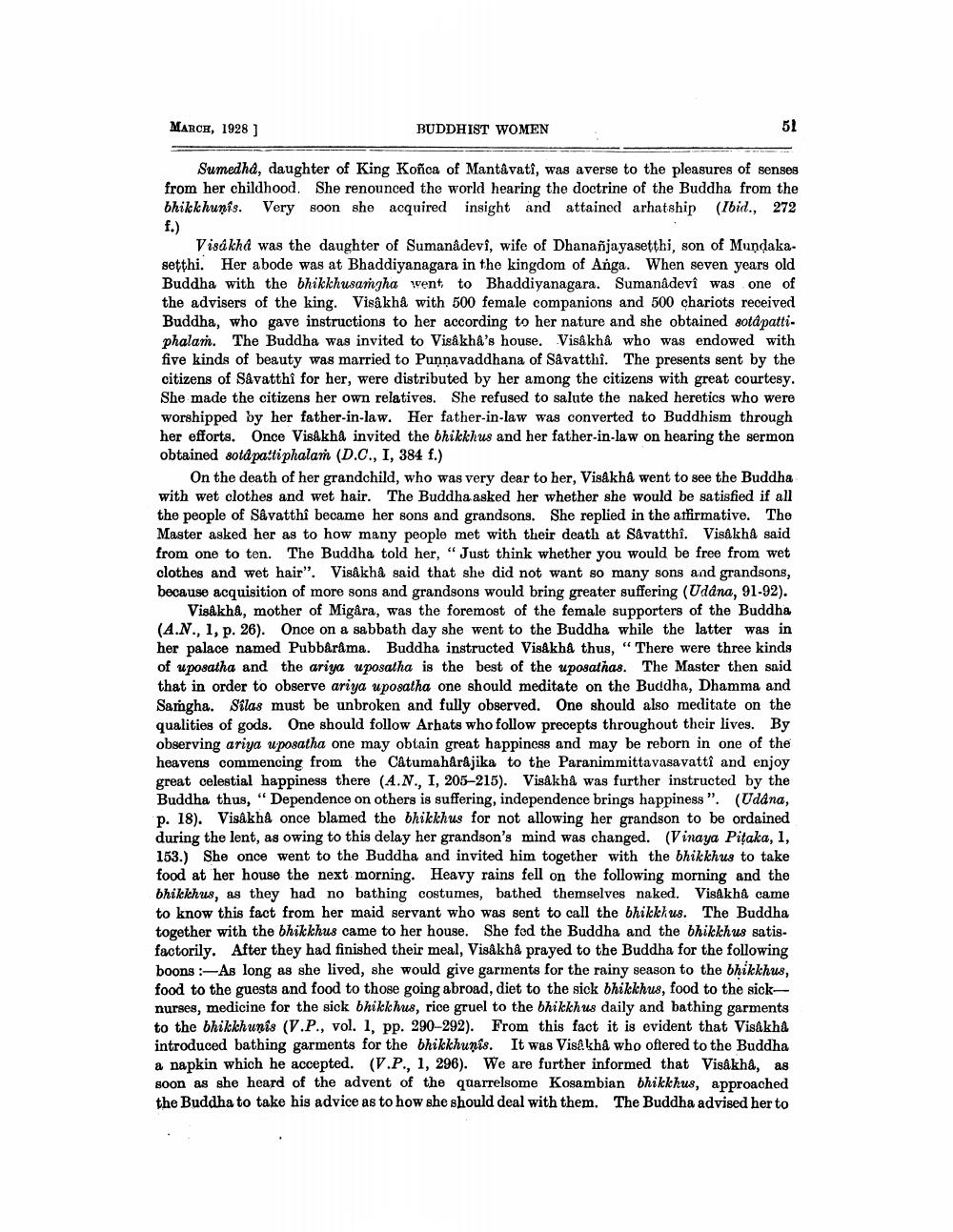________________
MARCE, 1928)
BUDDHIST WOMEN
51
Sumedha, daughter of King Koñca of Mantavati, was averse to the pleasures of senses from her childhood. She renounced the world hearing the doctrine of the Buddha from the bhikkhunís. Very soon she acquired insight and attained arhatship (Ibid., 272
f.)
Visakha was the daughter of Sumanâdevi, wife of Dhananjayasetthi, son of Mundakasetthi. Her abode was at Bhaddiyanagara in the kingdom of Anga. When seven years old Buddha with the bhikkhusaṁgha went to Bhaddiyanagara. Sumanâdevî was one of the advisers of the king. Visakhå with 500 female companions and 500 chariots received Buddha, who gave instructions to her according to her nature and she obtained sotápattiphalan. The Buddha was invited to Visakha's house. Visakha who was endowed with five kinds of beauty was married to Puņņavaddhana of Savatthî. The presents sent by the citizens of Såvatthi for her, were distributed by her among the citizens with great courtesy. She made the citizens her own relatives. She refused to salute the naked heretics who were worshipped by her father-in-law. Her father-in-law was converted to Buddhism through her efforts. Once Visakhå invited the bhikkhus and her father-in-law on hearing the sermon obtained sotd patti phalaṁ (D.C., 1, 384 f.)
On the death of her grandchild, who was very dear to her, Visakha went to see the Buddha with wet clothes and wet hair. The Buddha asked her whether she would be satisfied if all the people of Savatthî became her sons and grandsons. She replied in the affirmative. The Master asked her as to how many people met with their death at Savatthi. Visakha said from one to ten. The Buddha told her, "Just think whether you would be free from wet clothes and wet hair". Visakha said that she did not want so many sons and grandsons, because acquisition of more sons and grandsong would bring greater suffering (Udana, 91-92).
Visakha, mother of Migåra, was the foremost of the female supporters of the Buddha (A.N., 1, p. 26). Once on a sabbath day she went to the Buddha while the latter was in her palace named Pubbärama. Buddha instructed Visakha thus, "There were three kinds of uposatha and the ariya uposatha is the best of the uposathas. The Master then said that in order to observe ariya uposatha one should meditate on the Buddha, Dhamma and Sargha. Silas must be unbroken and fully observed. One should also meditate on the qualities of gods. One should follow Arhats who follow precepts throughout their lives. By observing ariya uposatha one may obtain great happiness and may be reborn in one of the heavens commencing from the Catumahåråjika to the Paranimmittavasavatti and enjoy great celestial happiness there (4.N., I, 205-215). Visakhå was further instructed by the Buddha thus, "Dependence on others is suffering, independence brings happiness". (Udana, p. 18). Visakha once blamed the bhikkhus for not allowing her grandson to be ordained during the lent, as owing to this delay her grandson's mind was changed. (Vinaya Pițaka, 1, 153.) She once went to the Buddha and invited him together with the bhikkhus to take food at her house the next morning. Heavy rains fell on the following morning and the bhikkhus, as they had no bathing costumes, bathed themselves naked. Visakha came to know this fact from her maid servant who was sent to call the bhikkkus. The Buddha together with the bhikkhus came to her house. She fed the Buddha and the bhikkhus satisfactorily. After they had finished their meal, Visakhå prayed to the Buddha for the following boons :-As long as she lived, she would give garments for the rainy season to the bhikkhus, food to the guests and food to those going abroad, diet to the sick bhikkhus, food to the sicknurses, medicine for the sick bhikkhus, rice gruel to the bhikkhus daily and bathing garments to the bhikichunis (V.P., vol. 1, pp. 290-292). From this fact it is evident that Visakha introduced bathing garments for the bhikkhunis. It was Visakha who oftered to the Buddha a napkin which he accepted. (V.P., 1, 296). We are further informed that Visakha, as soon as she heard of the advent of the quarrelsome Kosambian bhikkhus, approached the Buddha to take his advice as to how she should deal with them. The Buddha advised her to




